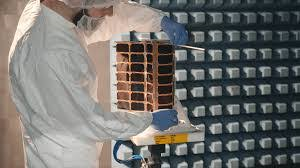British-built Mars Rover Passed Successful Parachute Tests
9th Jul 2021
British-built Mars rover, Rosalind Franklin, passed a series of successful high-altitude tests, which brings the UK Space Agency one step closer to Mars exploration. The UKSA published an official update on the matter on 2nd July.
Rosalind Franklin Mars Rover Tests & End Goals
The main goal of the first British-built Mars rover, built in Stevenage by Airbus and tested by UCL Mullard Space Science Laboratory, is to find any traces of life on Mars. The tech was created with the government backing, actively involved in the development of the UK space industry.
The latest successful tests were designed to determine if the Rosalind Franklin Mars rover could withstand the severe atmospheric conditions of the Red Planet. To this end, the descent vehicle had to be dropped from a stratospheric balloon, 29 km above Sweden. Even though the tests had to be rescheduled due to bad weather conditions, the results did not disappoint.
The 15-metre-wide first stage parachute operated flawlessly at high speed. The 35-metre-wide second-stage parachute was slightly damaged during the test but still performed a controlled landing onto the platform. So, even though the second-stage parachute will have to be reconfigured, Rosalind Franklin Mars Rover tests are still impressive.
UKSA Comment on British-Built Mars Rover Tests
According to Chris Castelli, UKSA Director of Programmes, Rosalind Franklin Mars rover results prove the UK’s space industry potential. This brings the country one step closer to designing the first British-built Mars rover, which will also become the first rover made in Europe.
Richard Franklin, Managing Director of Airbus Defence, is also optimistic about the test results. He adds that the first British-built Mars rover could not only strengthen the UK’s position in the international space market, but also inspire a new generation of UK citizens to pursue careers in space.






Thank you for your comment! It will be visible on the site after moderation.